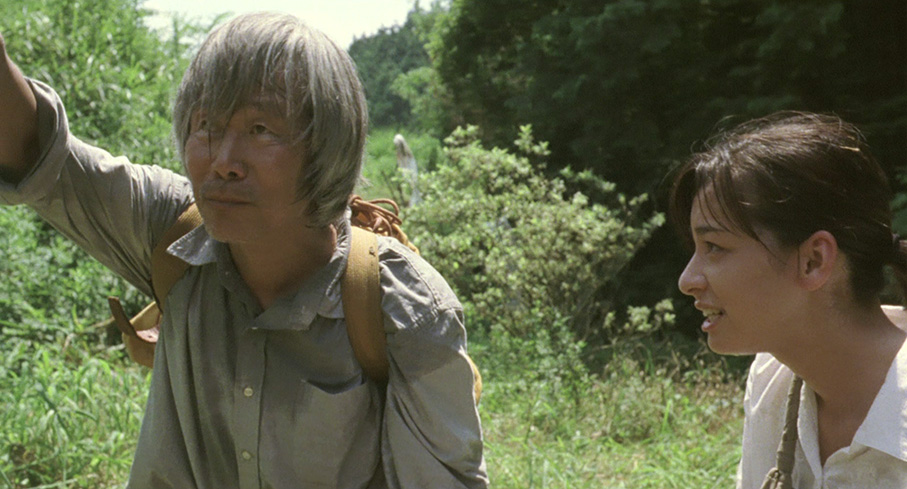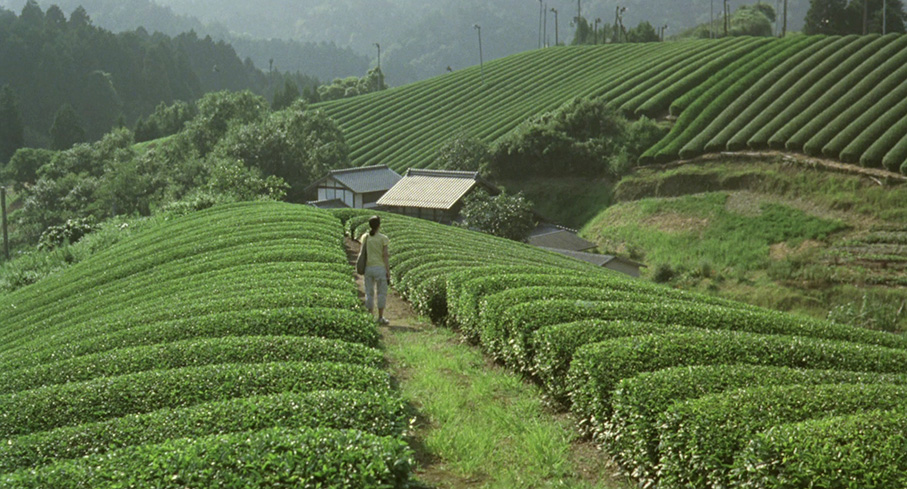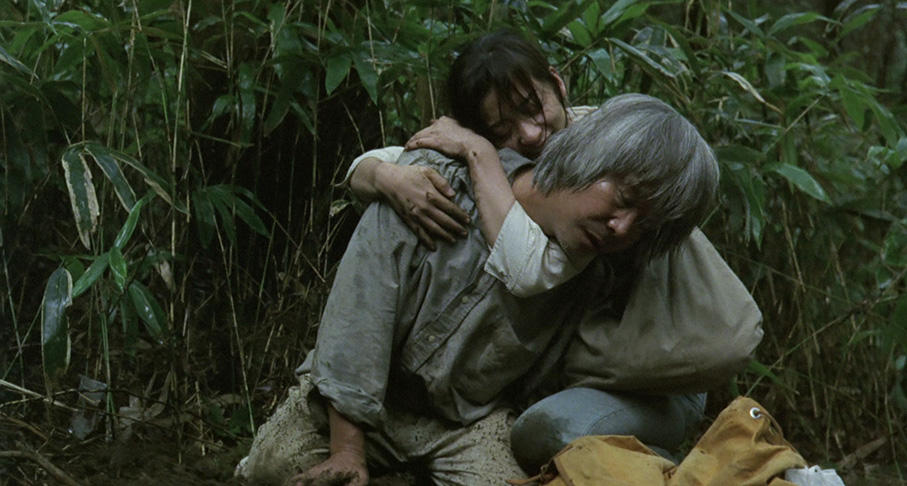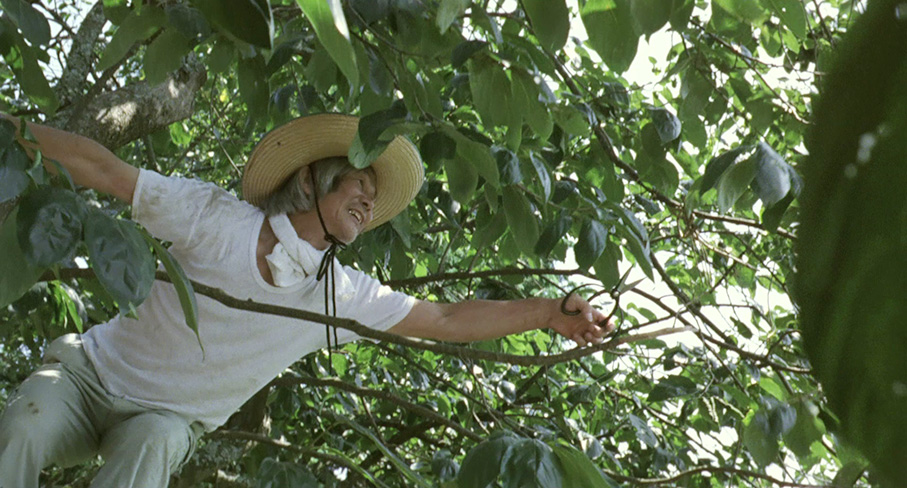|
The Mourning Forest is one of those titles that can be read in two ways, as the tale of a location in which mourning can take place or one in which the forest itself is somehow grieving, perhaps for some appalling transgression against nature committed by humankind. And being Japanese in origin, either is possible. But this is not an animated product of the Ghibli studio, but a 2007 work from Kawase Naomi, she of Sweet Bean and Still the Water, and it most definitely leans towards the first interpretation, but is laced with an intriguing whisper of the second.
The initial focus of the film is Machiko, a young woman who is still grieving over the death of her child, as she starts work at a care home in which she forms a bond with the elderly Shigeki, who lost his wife 33 years ago and is now suffering from dementia. As a birthday treat, Machiko takes him for a drive in the country, but when their car breaks down and Shigeki wanders off into the forest alone, both he and Machiko become lost and embark on an exhausting but ultimately enlightening journey in which they each attempt to come to terms with their respective losses.

It's a simple setup, delicately handled, one whose potent air of realism left me unsure at first whether I was watching a drama or a documentary – I'm willing to bet it's a blend of the two. Almost nothing is spelt out literally here. That Machiko has recently lost her child is communicated in a single, dimly lit shot of her lighting a candle beside the photo of a young boy, and more forcefully confirmed when her initially unseen husband angrily and tearfully berates her for letting go of their son's hand, an action that we are left to surmise inadvertently led to his death. Seemingly significant moments also take place away from the camera's gaze, which has a minimalist appeal that just may have been shaped in part by what we can assume was a micro-budget, negating the need to replace the elderly lead actor with a stunt man when he falls from the tree branch, or the potential cost of wrecking a perfectly good car when you can show what has happened solely from the angle at which it ends up perched.
That dementia has effectively transformed the elderly Shigeki into a child is central to his initially rocky relationship with Machiko, whose duties as a care worker subtly start to develop maternal aspects. At one point he destroys her calligraphy in what has the feel of a directionless tantrum, and later lashes out at her so aggressively that she suffers an injury to her arm that requires a hospital visit. His regression to childhood sees him gleefully climb a tree from which he eventually tumbles, and it's following this that he and Machiko experience an emotional breakthrough, as they run and hide from each other in the hedgerows in an improvised game that leaves them both laughing, a potentially corny sequence that beguiles through its handling and the strikingly beautiful hilltop location.

This unspoken bond between Machiko and Shigeki is strengthened by their shared sense of loss, as while 33 years have passed since the death of Shigeki's wife, his dementia has rendered this loss as fresh to him as the more recent tragedy that continues to haunt Machiko. As the two make their way through the forest, it is Machiko who becomes lost and desperate and Shigeki who seems to have a sense of purpose. Yet as exhaustion hits them both and rainwater soaks their clothing, Machiko's maternal instinct kicks in once again, loudly warning her companion not to cross a small stream and at one point shedding her clothing and warming him with her body heat by hugging him like a protective mother might do to a tearful child.
One of the real strengths of the film is that it never hammers these elements home, allowing them instead to evolve organically in a manner than never feels forced or obvious. Where opinion has been divided is over Kawase's low key observational approach, with seemingly inconsequential actions allowed to play out in unhurried real time, which some naysayers have seen as unproductively meandering. And while there is an underlying suggestion that that the lives and specifically the grieving process is directly connected to and even influenced by the forest in which this journey of self-discovery unfolds, the connection between man and nature is rarely implicit and could be at least partly in the eye of the beholder. It's a viewpoint I'll admit I had some sympathy with on my first viewing of the film. The intercutting of the human drama with imagery of the local flora and fauna is certainly never as overtly suggestive as in Imamura Shohei's 1968 Profound Desires of the Gods, and the concept of a late life regression into a childhood state harks back to the seven ages of man from Shakespeare's As You Like It and probably beyond, and is something I currently have very personal experience of dealing with.

But coming back to the film a second time, when I was better prepared for the unforced manner in which the story unfolds, I really warmed to Kawase's minimalistic approach and the fact that we're not hit over the head by the spiritual subtext. I also appreciated that we, as an audience, are allowed and even encouraged to make the often delicate connections between people, experiences, events and the natural world without feeling as if we are being pushed to do so. Such a bond between humankind and nature certainly has some parallels with the work of Apichatpong Weerasethakul, and while different in tone and technique and requiring a similar degree of patience on the part of the viewer, The Mourning Forest ultimately proves as gently bewitching, and left me in no doubt that I had absorbed considerably more during the course of the film than I actually watched unfold on the screen.
I've little doubt that The Mourning Forest was shot on HD, and while not quite reference quality, the image is generally crisp and detailed and the contrast well balanced, though black levels do soften just a tad in one of the darker scenes in the forest. The colours are naturalistic but dominated but the green hues of the natural landscape in which the care home is located. The framing is 1.85:1, and being digital in origin, the transfer is spotless.

When it comes to the soundtrack, you can choose between DTS-HD Master Audio 5.1 surround or Linear PCM 2.0 stereo. Sound plays an important role in the film, helping to create a strong sense of place and forge the connection between the human characters and their surroundings, and in terms of the consistently excellent clarity and dynamic range, there's little to choose between them. Both are impressively mixed, but the DTS track is inevitably more inclusive, subtly but evocatively enveloping a well-positioned viewer with the sounds of nature.
The optional English subtitles kick in by default.
Stills Gallery
64 high definition promotional and behind-the-scenes photos, which can be manually advanced.
Trailer (0:49)
A surprisingly unilluminating trailer that ends on a fade-out rather than a standard pack shot.
Booklet
Look, we're huge fans of the booklets that accompany Masters of Cinema releases, but in terms of content this has to be the least substantial one I've yet encountered, consisting of several large production stills (some or all of which you'll also find in the on-disc stills gallery) and a statement on the film from director Kawase from an interview conducted at Cannes after its Grand Prix win, which occupies just two-and-a-half clutter-free pages. The usual credits and viewing notes are also on board.
It won't work for some (and a quick bit of research confirms that it hasn't), but Kawase's gentle, minimalist approach gradually seduced me and ultinately won me over, while the similarities of some aspects of the story to my own, currently difficult home circumstances certainly touched a nerve. By Masters of Cinema standards, the disc is surprisingly and disappointingly light on extras, but the transfer is solid and the DTS soundtrack is absolutely top notch.
|